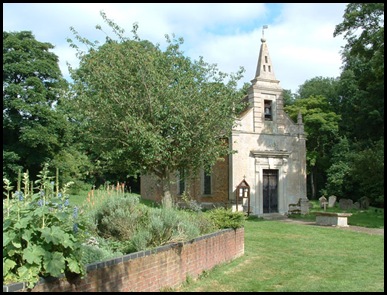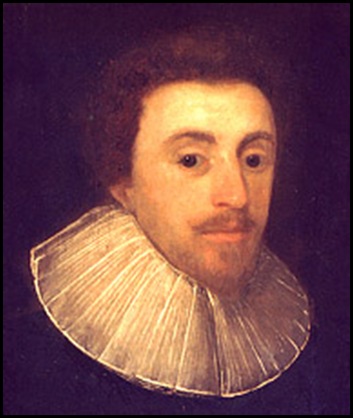If you came this way,
Taking the route you would be likely to take
From the place you would be likely to come from,
If you came this way in may time, you would find the hedges
White again, in May, with voluptuary sweetness.
It would be the same at the end of the journey,
If you came at night like a broken king,
If you came by day not knowing what you came for,
It would be the same, when you leave the rough road
And turn behind the pig-sty to the dull facade
And the tombstone. And what you thought you came for
Is only a shell, a husk of meaning
From which the purpose breaks only when it is fulfilled
If at all. Either you had no purpose
Or the purpose is beyond the end you figured
And is altered in fulfilment. There are other places
Which also are the world's end, some at the sea jaws,
Or over a dark lake, in a desert or a city—
But this is the nearest, in place and time,
Now and in England.
If you turn onto the old, rutted, one track roads in the isolated western part of Cambridgeshire, called Huntingdonshire, you will probably get lost fairly quickly. If you are lucky enough to find yourself on the desolate Old Western Road and head north you will come across the small hamlets of Steeple Gidding, Great Gidding, and if you are very lucky you will find Little Gidding and the small farm lane that leads through the fields to dead-end at the 12th century church of St John’s -‘The World’s End’. There is really no hamlet left since the Great Plague wiped out the inhabitants in 1348 and the Parliamentarians wiped out the resettled community in 1646. There is not much to look at. Just a very small church with no particular attributes, the ‘Dull Facade’ referred to by Eliot, at least not physically. Spiritually it is a place of enormous power and of great importance in the history of the human heart.
Here in 1625, Nicholas Ferrar resigned from Parliament and settled with his extended family to found the first religious community since the Dissolution of the Monasteries by Henry VIII in 1536. The Ferrar family set up residence in the old manor house and restored the abandoned church. Archbishop William Laud Ordained Nicholas to the Diaconate the same year. The community Read the Daily Offices from the Book of Common Prayer including a daily recitation of the entire Book of Psalms. They also kept a continual vigil of prayer in the sanctuary. They wrote books and stories of a spiritual nature, fasted regularly, and kept a life of poverty so as to be as free as possible financially to give to the poor. They spent their days in good works in the wider community teaching the children, caring for the sick and infirm, and visiting the old and vulnerable. King Charles I was so inspired by the religious zeal of the community that he visited it twice. The last time he was fleeing there for refuge after his defeat at the Battle of Naseby towards the end of the English Civil War: ‘If you came at night like a broken king’. Nicholas Ferrar died in 1637 and was buried in a tomb immediately in front of the church, Eliot’s ‘Tombstone’. His community continued however until the Puritan Parliamentarians under the rule of the Regicide denounced it as ‘an Arminian nunnery’ and forcibly dissolved it in 1646.
Although the community did not last long it set an example of what an Anglican Religious Community could look like. It was open, family orientated, and spiritually centred on the Book of Common Prayer. They were held together by the bonds of friendship and family and did not require formal vows. In 1913 during one of their yearly retreats to Little Gidding the Father Founders drew up the constitution of, and formally founded the Oratory of the Good Shepherd. They took Blessed Nicholas Ferrar as their patron. Years later the Oratory would found a parish church in Cambridge in honour of him.
Over the church door at Little Gidding is the quote taken out of the mouth of Jacob after he wakes from his dream about the angels ascending and descending the ladder from heaven:
“This is none other but the house of God, and this is the gate of heaven.” Genesis 28.17
As Eliot rightly points out, Little Gidding is a thin place that reminds you that the Peace of God is accessible everywhere and at all times. Even though wars may be raging there is still a peace that runs in eternity underneath of time. Eliot himself was trying to write in London during the air raids of the WWII and only broke his writers block by visiting Little Gidding. In places like Little Gidding that have been hollowed with prayer it is easier to remember to kneel down, open your heart to God, and let go. When one does then anywhere can literally become the ‘Gate of Heaven’. Then all falls into place “and what you thought you came for is only a shell, a husk of meaning”. We must remember with humility, that this is the chief purpose of our churches, to remind us of God. When we are able to pray deeply then each one of our parish churches becomes ‘The House of God’.
As one leaves the church one passes underneath the stained glass window that holds within a simple blue circle the dying words of Nicholas Ferrar to his brother John:
“It is the right good old way you are in. Keep in it.”
Soeteriological Efficacy is the key to knowing on this side, or more simply put, you shall know a tree by the fruit it produces. Nicholas Ferrar and the community of Little Gidding showed that at the heart of the Book of Common Prayer was a path of holiness that united prayer and good works, holiness of life and love for humanity. They proved that the Anglican path led somewhere, that the tree could produce the fruits of the Spirit. There were good reasons the Father Founders of the Oratory looked to Little Gidding as their spiritual home and their inspiration. Little Gidding gave encouragement and hope that the Religious Life in the Church of England could once again take root, sprout, and bear the fruit of the Catholic Faith.
If you came this way,
Taking any route, starting from anywhere,
At any time or at any season,
It would always be the same: you would have to put off
Sense and notion. You are not here to verify,
Instruct yourself, or inform curiosity
Or carry report. You are here to kneel
Where prayer has been valid. And prayer is more
Than an order of words, the conscious occupation
Of the praying mind, or the sound of the voice praying.
And what the dead had no speech for, when living,
They can tell you, being dead: the communication
Of the dead is tongued with fire beyond the language of the living.
Here, the intersection of the timeless moment
Is England and nowhere. Never and always.
Quotes from ‘Little Gidding’, The Four Quartets, T.S. Eliot, 1942.
The Feast Day for Nicholas Ferrar, Deacon, in the Anglican Church of Canada is December 4th.
The Feast Day for William Laud, Archbishop & Martyr, in the Anglican Church of Canada is January 10th.
The Feast Day for Charles Stuart, King & Martyr, in the Anglican Church of Canada is January 30th.







